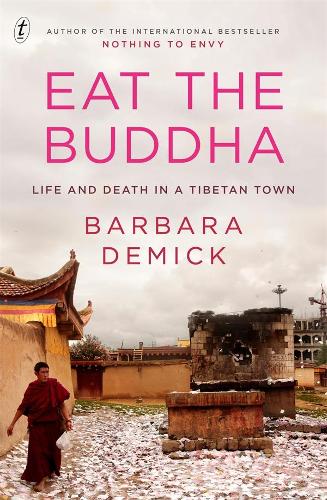
Eat the Buddha: Life and Death in a Tibetan Town
(Paperback)
Publishing Details
Eat the Buddha: Life and Death in a Tibetan Town
By (Author) Barbara Demick
Text Publishing
The Text Publishing Company
18th August 2020
Australia
Classifications
General
Non Fiction
Short-listed for Orwell Prize for Political Writing 2021 (UK)
Physical Properties
Paperback
336
Width 155mm, Height 234mm, Spine 25mm
462g
Description
A gripping portrait of contemporary Tibet, from the bestselling author of Nothing to Envy.
In the 1930s Maos Red Army fled to the Tibetan plateau to escape their adversaries in the Chinese Civil War. By the time the soldiers reached remote Ngaba, they were so hungry that they looted monasteries and ate religious statues made of flour and butterto Tibetans, it was as if they were eating the Buddha. These experiences would make the town a hotbed of Tibetan resistance for decades to come, culminating in shocking acts of self-immolation in recent years.
Eat the Buddha chronicles the tragic history of modern Tibet through the lives of award-winning journalist Barbara Demicks subjects. Among them are a princess whose family is wiped out during the Cultural Revolution, a young nomad who becomes radicalised in a monastery, and a schoolgirl forced to choose between her family and the lure of Chinese money.
Illuminating a society long romanticised as deeply spiritual, Demick reveals what it is like to be Tibetan today, trying to preserve ones culture, faith and language against the depredations of a seemingly unstoppable, all-seeing superpower.
Reviews
[An] outstanding work of journalism. * The Times on Nothing to Envy *
Elegantly structured and written, Nothing To Envy is a ground-breaking work of literary non-fiction. * Slate on Nothing to Envy *
A tour de force of meticulous reporting. * New York Review of Books on Nothing to Envy *
You simply cannot understand China without reading Barbara Demick on Tibet. Her work is fair-minded, chilling, awe-inspiringly rigorous, and as vivid as cinema. Eat the Buddha is a warning to anyone who tries to analyze China through its cities: you will misread the future if you overlook the war over diversity and the struggles for cultural survival. * Evan Osnos, author of Age of Ambition *
Barbara Demick has produced an elegiac narrative of a frontier town that is a hotbed of resistance on the Tibetan plateau. With novelistic depth and through characteristically painstaking research, Demick offers a poignant reminder of the enduring power of memory to illuminate untold histories. Eat the Buddha is an exemplary piece of storytelling. * Tsering Shakya, author of The Dragon in the Land of Snows *
Barbara Demicks new book is essential reading for anyone interested in China and Tibet. The reporting is rich, the writing is beautiful, and the stories will stay with you. I couldnt put it down. * John Pomfret, author of The Beautiful Country and the Middle Kingdom *
Deeply and meticulously researched, Eat the Buddha tells the story of the beautiful area of eastern Tibet, land of the fabled Mei kingdom, where the Tibetan people have thrived in a majestic environment for several millennia, only to suffer horrifically in the last seventy years with the invasion and colonization by the Communist Chinese. Demick is to be given highest honors for her unflinching account, and her readers will be rewarded with a transformative encounter with the real lives of some extraordinary people. * Robert A. F. Thurman, Jey Tsong Khapa Professor Emeritus, Columbia University *
MasterlyDemick covers an awe-inspiring breadth of history[Her] method is programmatic openness, deep listening, a willingness to be waylaid; the effect, a prismatic picture of history as experienced and understood by individuals in their full amplitude and idiosyncrasy. * New York Times *
PowerfulA deeply textured, densely reported and compelling explorationCaptures crushing historical events through the stories of individualsThe richness of this book lies in its nuance as much as its extraordinary detail. * Observer *
Demickweaves her stories seamlessly, the controlled and elegant writing counter-pointing the tumultuous tale[A] restrained rendering of powerful material. * Sydney Morning Herald *
Seemingly minor details dont just propel the narrative forward: they reveal a pointillist portrait. Demick is at once an intrepid reporter and scrupulous historian; she tells the story of Ngaba, however, like a novelist. * Guardian *
'Demick writes with luminous hope and you cant help but feel the actual existence of a book might shine a much-needed light on what the Chinese government is seeking to keep a tight lid on. * Bookmunch *
'Demicks story is extraordinary, her characters well-sketched. * Radio NZ *
[Gives] the endless oppression of the Tibetans by the Chinese a human face . * Spectator *
Searing...The book covers an awe-inspiring breadth of Tibetan history but through unforgettable, deeply intimate oral testimonies and a narrative broken into rotating perspectives a model inspired by John Herseys Hiroshima, and one that Demick has made her own. * New York Times *
Beautifully wrought portraits that Demick paints with depth, complexity and uncommon insight. A fully absorbing and compelling book that goes way beyond the headlines. * NPR *
Author Bio
Barbara Demick is the author of Nothing to Envy: Ordinary Lives in North Korea, a finalist for the National Book Award and the National Book Critics Circle Award, and Logavina Street: Life and Death in a Sarajevo Neighborhood. She was a reporter with the Los Angeles Times and headed the papers bureaus in Beijing and Seoul. Her work has won many awards, including the Samuel Johnson Prize (now the Baillie Gifford Prize) in the United Kingdom. She lives in New York City.
